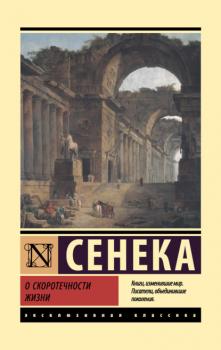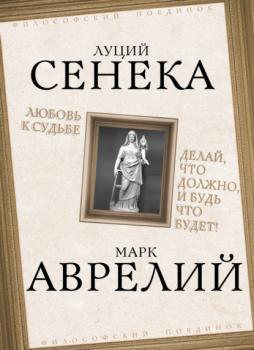ТОП просматриваемых книг сайта:
Луций Анней Сенека
Список книг автора Луций Анней СенекаАннотация
Луций Анней Сенека (ок. 55 г. до н. э. – 40 г. н. э.) – древнеримский философ-стоик, учившийся ораторскому мастерству в Риме, автор речей и трагедий, философских трактатов и писем.
Философские диалоги Сенеки – это наставления в стоицизме, учении о том, как достойно и осмысленно жить человеку, которому не во что верить и не на кого надеяться, это проповедь стойкости перед лицом ударов судьбы и своеобразная духовная терапия для всех нас.
В сборник вошли трактаты «О блаженной жизни», «О скоротечности жизни», «О стойкости мудреца», «О провидении» и «О гневе».
В формате a4.pdf сохранен издательский макет.
Аннотация
«Любовь к судьбе» («Amor fati») – одно из определяющих понятий учения стоиков, считающих, что с судьбой бороться бесполезно: того, кто не сопротивляется ей, она ведет за собой, а того, кто сопротивляется – тащит. Надо принимать всё, что дает судьба, но как быть с несчастьями, которые в любой момент могут случиться с каждым человеком?
Великие римские мыслители Сенека и Марк Аврелий дают ответ на этот вопрос. Душевное спокойствие зависит от многих причин, но, главное, «делай, что должно, и будь что будет», – говорил Марк Аврелий.
В книгу вошли наиболее значительные произведения Сенеки и Марка Аврелия, посвященные данной теме.
В формате PDF A4 сохранен издательский макет книги.
Аннотация
As chief advisor to the emperor Nero, Lucius Annaeus Seneca was most influential in ancient Rome as a power behind the throne. His lasting fame derives from his writings on Stoic ideology, in which philosophy is a practical form of self-improvement rather than a matter of argument or wordplay. Seneca's letters to a young friend advise action rather than reflection, addressing the issues that confront every generation: how to achieve a good life; how to avoid corruption and self-indulgence; and how to live without fear of death. Written in an intimate, conversational style, the letters reflect the traditional Stoic focus on living in accordance with nature and accepting the world on its own terms. The philosopher emphasizes the Roman values of courage, self-control, and rationality, yet he remains remarkably modern in his tolerant and cosmopolitan attitude. Rich in epigrammatic wit, Seneca's interpretation of Stoicism constitutes a timeless and inspiring declaration of the dignity of the individual mind.
Аннотация
As chief advisor to the emperor Nero, Lucius Annaeus Seneca was most influential in ancient Rome as a power behind the throne. His lasting fame derives from his writings on Stoic ideology, in which philosophy is a practical form of self-improvement rather than a matter of argument or wordplay. Seneca's letters to a young friend advise action rather than reflection, addressing the issues that confront every generation: how to achieve a good life; how to avoid corruption and self-indulgence; and how to live without fear of death. Written in an intimate, conversational style, the letters reflect the traditional Stoic focus on living in accordance with nature and accepting the world on its own terms. The philosopher emphasizes the Roman values of courage, self-control, and rationality, yet he remains remarkably modern in his tolerant and cosmopolitan attitude. Rich in epigrammatic wit, Seneca's interpretation of Stoicism constitutes a timeless and inspiring declaration of the dignity of the individual mind.
Аннотация
Musaicum Books presents to you the greatest works of Latin classical literature. The selection of books is based on Yale Department of Classics required reading list. Originally designed for students, this exceptional collection will benefit greatly everyone curious about the history, language, everyday life and culture of ancient Rome. This collection is a compound of ancient Roman wisdom, presenting all the major works of the classical era of Latin literature. By studying the art, history, and social dilemmas of the ancient civilizations person obtains the ability to look at the bigger picture of the present day, the social and political power struggle and ruptures, as well as other major problems of our contemporary society with a dapper understanding. Content: Plautus: Aulularia Amphitryon Terence: Adelphoe Ennius: Annales Catullus: Poems Lucretius: On the Nature of Things Julius Caesar: The Civil War Sallust: History of Catiline's Conspiracy Cicero: De Oratore Brutus Horace: The Odes The Epodes The Satires The Epistles The Art of Poetry Virgil: The Aeneid The Georgics Tibullus: Elegies Propertius: Elegies Cornelius Nepos: Lives of Eminent Commanders Ovid: The Metamorphoses Augustus: Res Gestae Divi Augusti Lucius Annaeus Seneca: Moral Letters to Lucilius Lucan: On the Civil War Persius: Satires Petronius: Satyricon Martial: Epigrams Pliny the Younger: Letters Tacitus: The Annals Quintilian: Institutio Oratoria Juvenal: Satires Suetonius: The Twelve Caesars Apuleius: The Metamorphoses Ammianus Marcellinus: The Roman History Saint Augustine of Hippo: The Confessions Claudian: Against Eutropius Boethius: The Consolation of Philosophy Plutarch: The Rise and Fall of Roman Supremacy: Romulus Poplicola Camillus Marcus Cato Lucullus Fabius Crassus Coriolanus Cato the Younger Cicero
Аннотация
This collection is based on the required reading list of Yale Department of Classics. Originally designed for students, this anthology is meant for everyone eager to know more about the history and literature of this period, interested in poetry, philosophy and rhetoric of Ancient Rome. Latin literature is a natural successor of Ancient Greek literature. The beginning of Classic Roman literature dates to 240 BC. From that point on, Latin literature would flourish for the next six centuries. Latin was the language of the ancient Romans, but it was also the lingua franca of Western Europe throughout the Middle Ages. Consequently, Latin Literature outlived the Roman Empire and it included European writers who followed the fall of the Empire, from religious writers like Aquinas, to secular writers like Francis Bacon, Baruch Spinoza, and Isaac Newton. This collection presents all the major Classic Roman authors, including Cicero, Virgil, Ovid and Horace whose work intrigues and fascinates readers until this day. Content: Plautus: Aulularia Amphitryon Terence: Adelphoe Ennius: Annales Catullus: Poems and Fragments Lucretius: On the Nature of Things Julius Caesar: The Civil War Sallust: History of Catiline's Conspiracy Cicero: De Oratore Brutus Horace: The Odes The Epodes The Satires The Epistles The Art of Poetry Virgil: The Aeneid The Georgics Tibullus: Elegies Propertius: Elegies Cornelius Nepos: Lives of Eminent Commanders Ovid: The Metamorphoses Augustus: Res Gestae Divi Augusti Lucius Annaeus Seneca: Moral Letters to Lucilius Lucan: On the Civil War Persius: Satires Petronius: Satyricon Martial: Epigrams Pliny the Younger: Letters Tacitus: The Annals Quintilian: Institutio Oratoria Juvenal: Satires Suetonius: The Twelve Caesars Apuleius: The Metamorphoses Ammianus Marcellinus: The Roman History Saint Augustine of Hippo: The Confessions Claudian: Against Eutropius Boethius: The Consolation of Philosophy Plutarch: The Rise and Fall of Roman Supremacy: Romulus Poplicola Camillus Marcus Cato Lucullus Fabius Crassus Coriolanus Cato the Younger Cicero
Аннотация
As chief advisor to the emperor Nero, Lucius Annaeus Seneca was most influential in ancient Rome as a power behind the throne. His lasting fame derives from his writings on Stoic ideology, in which philosophy is a practical form of self-improvement rather than a matter of argument or wordplay. Seneca's letters to a young friend advise action rather than reflection, addressing the issues that confront every generation: how to achieve a good life; how to avoid corruption and self-indulgence; and how to live without fear of death. Written in an intimate, conversational style, the letters reflect the traditional Stoic focus on living in accordance with nature and accepting the world on its own terms. The philosopher emphasizes the Roman values of courage, self-control, and rationality, yet he remains remarkably modern in his tolerant and cosmopolitan attitude. Rich in epigrammatic wit, Seneca's interpretation of Stoicism constitutes a timeless and inspiring declaration of the dignity of the individual mind.
Аннотация
"Minor Dialogues, Together With the Dialogue on Clemency" by Lucius Annaeus Seneca (translated by Aubrey Stewart). Published by Good Press. Good Press publishes a wide range of titles that encompasses every genre. From well-known classics & literary fiction and non-fiction to forgotten−or yet undiscovered gems−of world literature, we issue the books that need to be read. Each Good Press edition has been meticulously edited and formatted to boost readability for all e-readers and devices. Our goal is to produce eBooks that are user-friendly and accessible to everyone in a high-quality digital format.
Аннотация
"Between Heathenism and Christianity" by Lucius Annaeus Seneca, Plutarch, Charles William Super. Published by Good Press. Good Press publishes a wide range of titles that encompasses every genre. From well-known classics & literary fiction and non-fiction to forgotten−or yet undiscovered gems−of world literature, we issue the books that need to be read. Each Good Press edition has been meticulously edited and formatted to boost readability for all e-readers and devices. Our goal is to produce eBooks that are user-friendly and accessible to everyone in a high-quality digital format.
Аннотация
e-artnow presents to you the greatest works of Roman classical literature. The selection of books is based on Yale Department of Classics required reading list. Originally designed for students, this exceptional collection will benefit greatly everyone curious about the history, language, everyday life and culture of ancient Rome. This collection is a compound of ancient Roman wisdom, presenting all the major works of the classical era of Latin literature. By studying the art, history, and social dilemmas of the ancient civilizations person obtains the ability to look at the bigger picture of the present day, the social and political power struggle and ruptures, as well as other major problems of our contemporary society with a dapper understanding. Content: Plautus: Aulularia Amphitryon Terence: Adelphoe Ennius: Annales Catullus: Poems Lucretius: On the Nature of Things Julius Caesar: The Civil War Sallust: History of Catiline's Conspiracy Cicero: De Oratore Brutus Horace: The Odes The Epodes The Satires The Epistles The Art of Poetry Virgil: The Aeneid The Georgics Tibullus: Elegies Propertius: Elegies Cornelius Nepos: Lives of Eminent Commanders Ovid: The Metamorphoses Augustus: Res Gestae Divi Augusti Lucius Annaeus Seneca: Moral Letters to Lucilius Lucan: On the Civil War Persius: Satires Petronius: Satyricon Martial: Epigrams Pliny the Younger: Letters Tacitus: The Annals Quintilian: Institutio Oratoria Juvenal: Satires Suetonius: The Twelve Caesars Apuleius: The Metamorphoses Ammianus Marcellinus: The Roman History Saint Augustine of Hippo: The Confessions Claudian: Against Eutropius Boethius: The Consolation of Philosophy Plutarch: The Rise and Fall of Roman Supremacy: Romulus Poplicola Camillus Marcus Cato Lucullus Fabius Crassus Coriolanus Cato the Younger Cicero










